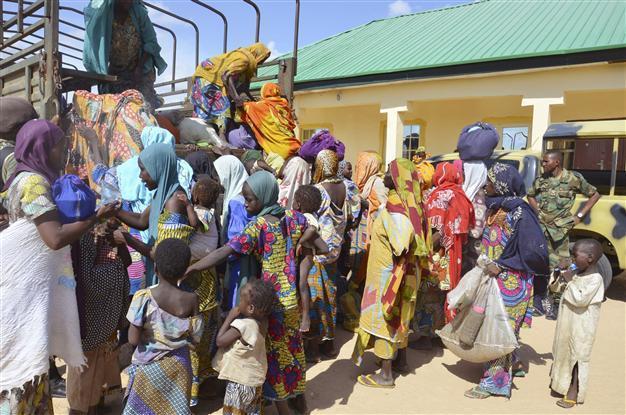Nigerian army says has freed nearly 180 Boko Haram hostages
MAIDUGURI, Nigeria - Agence France-Presse

In this Thursday, July. 31, 2015 file photo, women and children rescued by Nigerian soldiers from Boko Haram extremists in the northeast of Nigeria arrive at the military office in Maiduguri. AP Photo
The Nigerian army has freed 178 people being held hostage by Boko Haram including more than 100 children, it said late on August 2, following a series of deadly attacks by the jihadists in the country's restive northeast.
"During the offensive operations, 178 people held captives by the terrorists were rescued, they include 101 children, 67 women and 10 men respectively," military spokesman Colonel Tukur Gusau said in a statement.
The dramatic rescue, which the army said also led to the capture of a Boko Haram commander, took place near Aulari about 70 kilometres (40 miles) south of Maiduguri, the biggest town in northeast Nigeria, the spokesman said. He did not specify when the operation was conducted.
The Nigerian military has announced the release of hundreds of people held captive by Boko Haram in recent months, especially in the notorious Sambisa forest, a longtime Islamist stronghold where militants have pledged allegiance to the Islamic State of Iraq and the Levant (ISIL).
The release of the hostages came after several attacks by Boko Haram fighters in recent days, who killed 13 people in an assault on Malari village in northeast Nigeria's restive Borno state early on August 2, witnesses said.
Also on August 2, the army said it had carried out air strikes in the northeast to repel an attack by the jihadist group and had killed a "large number" of the extremists.
The Nigerian Air Force said it had "successfully repelled an attack on Bita village by the Boko Haram terrorist group" in a combined operation with ground troops after spotting militants planning an assault.
Local farmer Moha Saleh said 13 people were killed and 27 wounded in the August 2 attack, which began when the Islamists stormed the village.
"They also set many houses ablaze after accusing us of telling soldiers their whereabouts," he told AFP.
Local resident Goni Musa, a vigilante who fights against Boko Haram alongside the Nigerian military, gave the same death toll.
"This morning 13 bodies were recovered, some had been shot in the back, which means they were fleeing when the terrorists killed them," Musa said.
"They burnt down houses and shops before they left, yelling 'Allahu Akbar' (God is great). Our terrorised women and children fled into the bush and returned to Maiduguri this morning," he added.
Maiduguri is some 20 kilometres north of Malari.
State police commissioner Aderemi Opadokun confirmed the attack but gave a lower toll, saying seven people had been killed.
Malari has been the target of numerous attacks in recent months, including a suicide bombing by a youth in a mosque in the middle of the Muslim holy month of Ramadan in July which left 12 people dead.
Boko Haram's bloody insurgency in Nigeria alone has left more than 15,000 people dead since 2009. In recent months, the group has increasingly expanded its operations into neighbouring countries.
Nigeria and its neighbours are preparing to launch a new multinational force to combat the militants, in the face of the group's escalating violence in the region.
The new 8,700-strong multinational force -- made up of troops from Nigeria as well as Cameroon, Chad and Niger -- is expected to go into action soon, officials say.
The president of neighbouring Niger, Mahamadou Issoufou, expressed his confidence that the new regional force would succeed in "eradicating" the insurgents.
"The multinational joint force will allow eradication... of the blind terrorism of Boko Haram," Issoufou said in a televised speech on August 2.
Boko Haram was also accused of attacking the town of Gamboru on August 1, near the border with Cameroon.
Witnesses in nearby villages said the militants had set fire to houses, sending columns of black smoke into the sky.
Umar Babakalli, a refugee from Gamboru who fled to the nearby Cameroonian town of Fotokol several months ago, said he saw fighter jets circling overhead "but there was no sign of any bombardment".
It was not immediately clear if the fires had caused any victims but Babakalli said Gamboru, a town which has faced repeated Boko Haram assaults, was deserted. "There is nobody in Gamboru," he told AFP.
